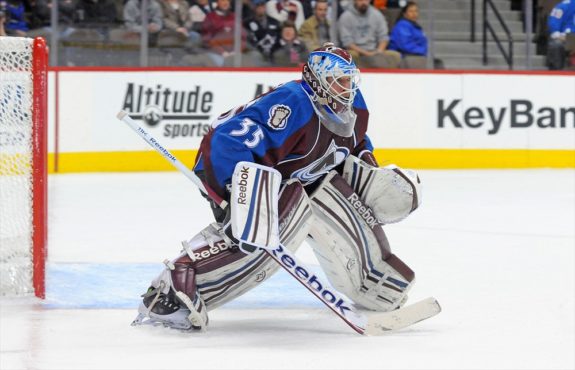It was over 12 years ago when the Toronto Maple Leafs, who were struggling during the 2009-10 season, were in search of a goalie to turn things around just three months into the season.
At the time, the Maple Leafs were running with with a goalie tandem of Jonas Gustavsson and Vesa Toskala and both goalies were sitting around the .500 mark or lower. Toskala, who was supposed to be their top goalie, had a sub-.900 save percentage and a goals against average over 3.50, while Gustavsson was hanging around the .900 SV% mark. That said, the team just wasn’t getting it done.

So, in late January, the Maple Leafs made two moves to try and improve their squad. The first saw the Maple Leafs acquire a physical and offensively-skilled defenceman in Dion Phaneuf from the Calgary Flames in a seven-player deal. The second saw the Maple Leafs ship out the struggling Toskala, along with Jason Blake, to the Anaheim Ducks for Jean-Sébastien Giguère.
Giguère had won a Conn Smythe as the losing goaltender during the 2002-03 Stanley Cup Final, but finally added his Cup in 2006-07 just three seasons before joining the Maple Leafs.
Maple Leafs Float Toskala, Blake to Ducks
Let’s start with the struggling goaltender. Toskala went over to the Ducks, but never played a game for them following the trade. In fact, less than two months later, Toskala was moved yet again by the Ducks — this time to the Calgary Flames, in exchange for Curtis McElhinney.
Toskala played just six games for the Flames to close out the 2009-10 season before ending his NHL career. As for McElhinney, he played 31 games for the Ducks in the regular season over parts of two seasons with a record of 11-10-3 to go along with a .899 SV% and 3.20 GAA. Funny enough, he would later join the Maple Leafs organization in 2016-17.
Related: Frederik Andersen Trade Revisited
As for the other piece in the deal, Blake played the remaining two and a half seasons of his NHL career with the Ducks following the trade. He suited up for 147 regular season games and tucked 29 goals and 59 points over that span. He never did find his 40-goal prowess that he had at the age of 33 with the New York Islanders, but he did reach the 16-goal mark in 2010-11 as a 37-year-old with the Ducks.
It’s safe to say that the Ducks didn’t get exactly what they needed over the next few seasons, but Blake did see some playoff action with the Ducks too in 2010-11 with three goals and four points in six games before being eliminated. Blake retired following the 2011-12 season in which he had seven goals and 12 points in 45 regular season games.
Maple Leafs Got Giggy With It
Giguère was the focal point of the trade, obviously. The Maple Leafs were looking to part ways with Toskala and at the time Giguère was available and made sense. That said, he didn’t fair much better during his time with the team.
He played 48 regular season games for the Maple Leafs with a 17-18-6 record. He had a 2.73 GAA and .906 SV% over that span as well and while those numbers aren’t horrible, they weren’t good enough for a team that was looking for answers.
In both seasons, the Maple Leafs missed the playoffs and Giguère ended up leaving following the 2010-11 season, signing a new contract with the Colorado Avalanche as an unrestricted free agent.
While he didn’t say much about his time playing for the organization, Giguère did say in 2015 that playing in the city of Toronto came with some negatives — including the media and reporters that he felt were “not objective” and often “emotional when they talk about the players or the game.”
Maple Leafs or Ducks: Who Won?
Looking at both outcomes, there isn’t really a clear cut winner of this trade. From the Maple Leafs’ standpoint, Giguère’s numbers were average. Like a number of goalies before him, he seemed to be on the back nine of his career when he suited up for the Maple Leafs and he never really stole the show for the blue and white.
On top of that, he left Toronto at the end of his contract and joined the Avalanche — meaning his stint lasted just over a season with the Maple Leafs. That said, considering what they gave up in the deal it wasn’t that much of a loss.
Related: Alexei Yashin Trade Revisited
In fact, the only reason that this may come out as a win for the Maple Leafs rather than the Ducks is the fact that Toronto was able to rid themselves of Jason Blake’s contract that they had signed on July 1, 2007.
The contract was signed by then-general manager John Ferguson Jr. and it was a five-year deal that carried a cap hit and annual average value of $4 million. By moving him, along with the struggling Toskala, the Maple Leafs were able to get out of his contract just two and half seasons into it.
Meanwhile, Blake’s tenure in Anaheim wasn’t overwhelmingly impressive and Toskala was moved before ever playing a game. So, if you had to pick a winner in this deal, it might have to go to the Maple Leafs for simply shedding themselves of Blake’s contract and Toskala at a time where his career was coming to a close.